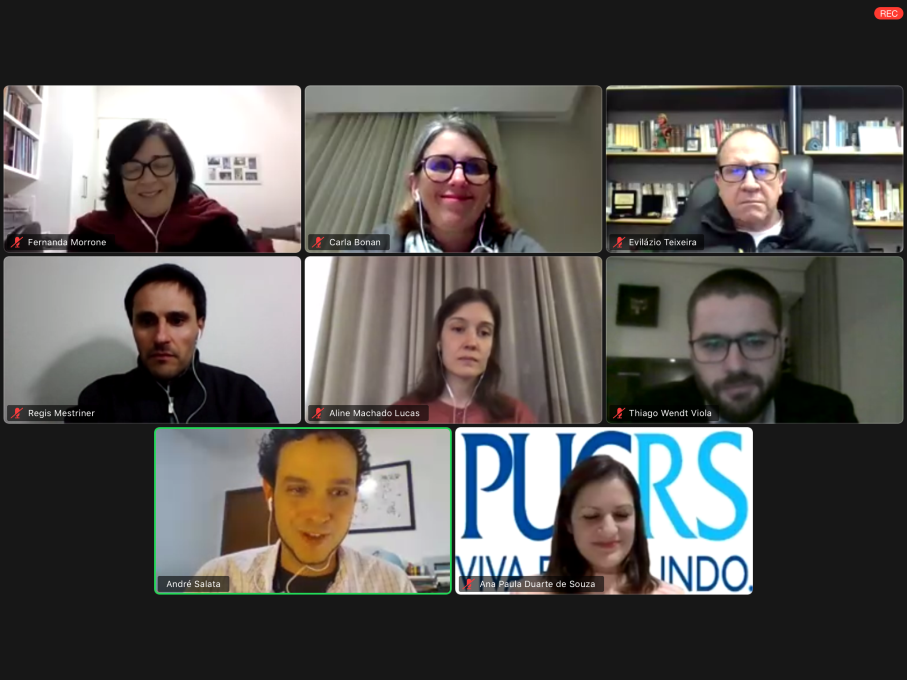On National Science Day, researchers discussed challenges and opportunities for scientists
 On Wednesday, Jul 8, in celebration of the National Science and Researcher Day, the Office of the Vice President for Research and Graduate Studies held a webinar on Science and Transformation of Society. The event aimed to discuss the relevance of science and the role of researchers in society.
On Wednesday, Jul 8, in celebration of the National Science and Researcher Day, the Office of the Vice President for Research and Graduate Studies held a webinar on Science and Transformation of Society. The event aimed to discuss the relevance of science and the role of researchers in society.
The President Br. Evilázio Teixeira, the Vice President for Research and Graduate Studies, Dr. Carla Bonan, and the Dean of Research, Dr. Fernanda Bueno Morrone, made their presences felt in the opening. On the occasion, Bonan stressed the importance of the date, reinforcing the relevance of science to the advances of humanity. “Doing science is a challenge. It does not depend only on individual efforts, but on investments in the development of an ecosystem that promotes the search for scientific knowledge, from Elementary to Higher education “, she added.
The President of PUCRS Br. Evilázio Teixeira congratulated the University’s scientists on the date and thanked them for their dedicated engagement and for their role in teaching and doing research in the current scenario. “Events like this confirm our commitment as a scientific community to integrity, ethics, boldness and dignity. Today, more than in other times, research has become a path to innovation and entrepreneurship, as a vector to solve problems demanded by society “, he added.
The President also celebrated the excellence of the research developed at PUCRS, which is among the 20 best institutions in Latin America, as it stands out especially in the area of research, citations, teaching and international perspectives.
Dr. Fernanda Morrone welcomed the participants and spoke about the University’s new scientific publication: PUCRS Excellence in Research. The magazine contains dozens of studies conducted by more than 50 researchers from the University, grouped into five major strategic themes:
The publication also provides an overview of current research on COVID-19 conducted at the University, in response to this important demand from society. “All of these studies are developed in more than 500 structures of our University, including laboratories, centers and institutes, and in our 23 Graduate Programs “, she said. Check out the full version of the magazine here.
Then, a debate mediated by the School of Health and Life Sciences Professor Dr. Régis Mestriner featured four young researchers who are a reference in their areas of expertise: Aline Machado Lucas (School of Technology), Ana Paula Duarte de Souza (School of Health and Life Sciences), André Salata (School of Humanities) and Thiago Wendt Viola (School Of Medicine).
The first question raised by the public was about the main challenges of doing science and pursuing a career in research today. Salata highlighted the fact that researchers are also resource managers – as they manage both time and money. “Knowing how to manage these resources is a major challenge, both in terms of how to juggle research time with other activities, and in working systematically on your project with the available funds,” he said.
Viola claimed that the challenge also involves doing research in the current moment we are going through. “It is challenging to stick to the purpose when public opinion is so divided, as some believe in science and others are reluctant about its relevance,” he adds.
Another issue brought forth by the public involved investing in research since Primary school to prepare society for science. Aline stated that introducing research at early age is very important as she showed that any findings result from a process that is essential for society as a whole to understand the researcher’s work in a practical way.
“I also believe that scientific communication is fundamental for society to be able to absorb the knowledge produced and trust the relevance of this work. Science takes time, but it is essential to move forward “, Ana Paula said.
André Salata stated that the crisis and the questions about scientific discourse have propelled researchers to think of new ways to catalyze knowledge for the general public, in a careful and democratic way.
Maintaining productivity, staying focused and staying dedicated to your research has become a challenge for many people during the Covid-19 pandemic. When asked about tips for keeping academic and research dedication, Salata reinforced the importance of keeping a research routine. “Research is systematic as it involves analyses of data and reading articles. Set aside some time in your day to conduct your research, as this will allow you to achieve success ahead “, he advised.
Viola said that the current moment can be used to study theories which are essential for a well-developed research. “It can also be a time to learn more about data analysis, looking for online tools for training,” he concluded.